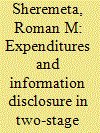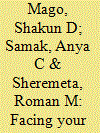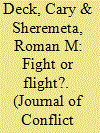|
|
|
Sort Order |
|
|
|
Items / Page
|
|
|
|
|
|
|
| Srl | Item |
| 1 |
ID:
100287


|
|
|
|
|
| Publication |
2010.
|
| Summary/Abstract |
This laboratory experiment studies two-stage contests between political parties. In the first stage, parties run their primaries, and in the second stage, the winners of the primaries compete in the general election. The resource expenditures in the first stage by the winning candidates are partially or fully carried over to the second stage. Experimental results support all major theoretical predictions: the first-stage expenditures and the total expenditures increase, while the second-stage expenditures decrease in the carryover rate. Consistent with the theory, the total expenditures increase in the number of candidates and the number of parties. Contrary to the theory, however, expenditures in both stages of the competition exceed theoretical predictions. Disclosing information about the opponent's expenditures in the first stage increases the second-stage expenditures and decreases the first-stage expenditures.
|
|
|
|
|
|
|
|
|
|
|
|
|
|
|
|
| 2 |
ID:
144799


|
|
|
|
|
| Summary/Abstract |
We experimentally investigate the effect of social identification and information feedback on individual behavior in contests. In all treatments, we find significant overexpenditure of effort relative to the standard theoretical predictions. Identifying subjects through photo display decreases wasteful effort. Providing information feedback about others’ effort does not affect the aggregate effort, but it decreases the heterogeneity of effort and significantly affects the dynamics of individual behavior. A behavioral model that incorporates a nonmonetary utility of winning and relative payoff maximization explains significant overexpenditure of effort. It also suggests that decrease in “social distance” between group members through social identification promotes prosocial behavior and decreases overexpenditure of effort, while improved information feedback decreases the heterogeneity of effort.
|
|
|
|
|
|
|
|
|
|
|
|
|
|
|
|
| 3 |
ID:
115730


|
|
|
|
|
| Publication |
2012.
|
| Summary/Abstract |
This article examines theory and behavior in a two-player game of siege, sequential attack and defense. The attacker's objective is to successfully win at least one battle, while the defender's objective is to win every battle. Theoretically, the defender either folds immediately or, if his valuation is sufficiently high and the number of battles is sufficiently small, then he has a constant incentive to fight in each battle. Attackers respond to defense with diminishing assaults over time. Consistent with theoretical predictions, the authors' experimental results indicate that the probability of successful defense increases in the defenders valuation and it decreases in the overall number of battles in the contest. However, the defender engages in the contest significantly more often than predicted and the aggregate expenditures by both parties exceed predicted levels. Moreover, both defenders and attackers actually increase the intensity of the fight as they approach the end of the contest.
|
|
|
|
|
|
|
|
|
|
|
|
|
|
|
|
| 4 |
ID:
133704


|
|
|
|
|
| Publication |
2014.
|
| Summary/Abstract |
We design an experiment to explore the impact of earned entitlements on the frequency and intensity of conflicts in a two-stage conflict game where players may attempt to use non-binding side-payments to avoid conflict. In this game, Proposers make offers and Responders decide simultaneously whether to accept the offers and whether to engage in a conflict. A simple theoretical analysis suggests that Proposers should never offer side-payments because Responders should always accept them and then still choose to enter conflict; however, our experiment reveals that some individuals use this non-binding mechanism to avoid conflict. Moreover, when subjects earn their roles (Proposer or Responder), conflicts are 44% more likely to be avoided than when roles are assigned randomly. Earned entitlements impact behavior in three important ways: (1) Proposers who have earned their position persistently make larger offers; (2) larger offers lead to a lower probability of conflict; but (3) Proposers whose offers do not lead to conflict resolution respond spitefully with greater conflict expenditure. Hence, with earned rights, the positive welfare effects of reduced conflict frequency are offset by higher conflict intensity. This result differs from previous experimental evidence from ultimatum games in which earned entitlements tend to encourage agreement and increase welfare; thus, our findings highlight the important consequences of endogenizing the costs of conflict. Our analysis suggests that earned entitlements alter behavior by influencing the beliefs of Proposers about the willingness of Responders to accept a peaceful resolution. As a result, these Proposers make persistent high offers, and when their beliefs are disappointed by a Responder's decision to accept a side-payment and still enter conflict, they retaliate.
|
|
|
|
|
|
|
|
|
|
|
|
|
|
|
|
|
|
|
|
|